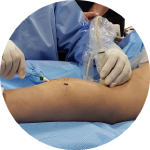Ultrasound-guided Foam Sclerotherapy
Clinical Indications, Safety, Compounded vs. Commercial
Jan 2023
The usage of Ultrasound-guided Foam Sclerotherapy brings multiple questions: where to use it, what type to use, whether it’s safe, and even whether to use it at all. Nick Morrison, MD, FACS, FACPh, RPhS, gave a rundown of answers and insights during Ultrasound-guided Foam Sclerotherapy. The brief lecture, along with many other intriguing sessions, is available through Vein Global, the online repository for venous disease and treatment education.
Dr. Morrison began with clinical indications for use of the foam. Those include primary treatment for truncal veins (incompetent great or small saphenous veins); residual truncal vein after proximal ablation; recurrence following great saphenous vein stripping or ablation; incompetent tributary; venous malformations; sciatic nerve varices; and saphenous or non-saphenous perforating veins, on occasion.
He also spoke about the use of physician-compounded foam (PCF) versus commercial foam. There is, he said, some medicolegal liability. Manufactured commercial foam, if used as approved, can only be used on great saphenous vein, anterior accessory saphenous vein or posterior accessory saphenous vein visible varicosities. Use on incompetent nonvisible tributaries, perforators or small saphenous veins is considered “off label.” The use of an FDA-approved sclerosant physician compounded foam, meanwhile, is considered “at least off label,” he said. “But the FDA has never ruled on foam sclerosants, whether it’s off label or a new drug or what it is, so I think your exposure to problems with the feds is very unlikely.”
In the event of an adverse outcome, the use of either PCF or a manufactured foam is defensible, with certain conditions: the homemade foam has been produced with FDA-approved sclerosant; there’s been adequate training and experience; appropriate indications, methodology and patient care; and “the practitioner is not a bonehead,” he quipped. “Don’t even get me started about compounded drugs.” He touched on a study regarding improper potency and impurities in compounded polidocanol, noting that none of the seven samples from three compounded pharmacies contained the labeled concentration of the polidocanol. Five of the samples contained “excessive levels of impurities.” Informed consent, then, means informing the patient of the use of a compounded drug; stating that there’s a commercial product available; sharing the benefits of the compounded drug versus the commercial product; going over the cost difference; and letting the patient decide whether they want to pay extra for the commercial product.
If a physician chooses to use a compounded drug and there’s an adverse outcome, and a connection can be made between the injury and the drug, the physician is liable, he said. “Period.”
He covered his own techniques and preferences for foam production and administration, as well as results from studies related to foam safety.
In conclusion, he said, “Ultrasound-guided foam sclerotherapy is safe, effective and associated with few, mild, short-lived side effects and very infrequent or rare significant complications. I really believe the variability in foam production, the equipment and the methods, are probably responsible for the differing levels of efficacy and safety.”
Knowledge and insight are ready for the taking at Vein Global. Why not join today
Recent Posts

Review of Radiofrequency Ablation Devices

Overtreatment in CVD Leads to Superficial Ablation Abuse

Ultrasound-guided Foam Sclerotherapy

Recurrent Stent Occlusion: Endovenectomy, Bypass, or Compression Only

Optimizing Deep Vein Images: The Profunda Femoris Vein

A Closer Look at Swollen Legs: Edema Differentiation

Vein Global and IVC are Evolving to Launch the Next Decade of Endovascular Innovation and Education

Phlebectomy: Technical Steps with Jose I. Almeida, MD, FACS, RPVI, RVT

The Spectrum of Vacuum-Assisted Venous Thrombectomy

Sclerotherapy: Technical Steps with Julian J. Javier, MD, FSCAI, FCCP

